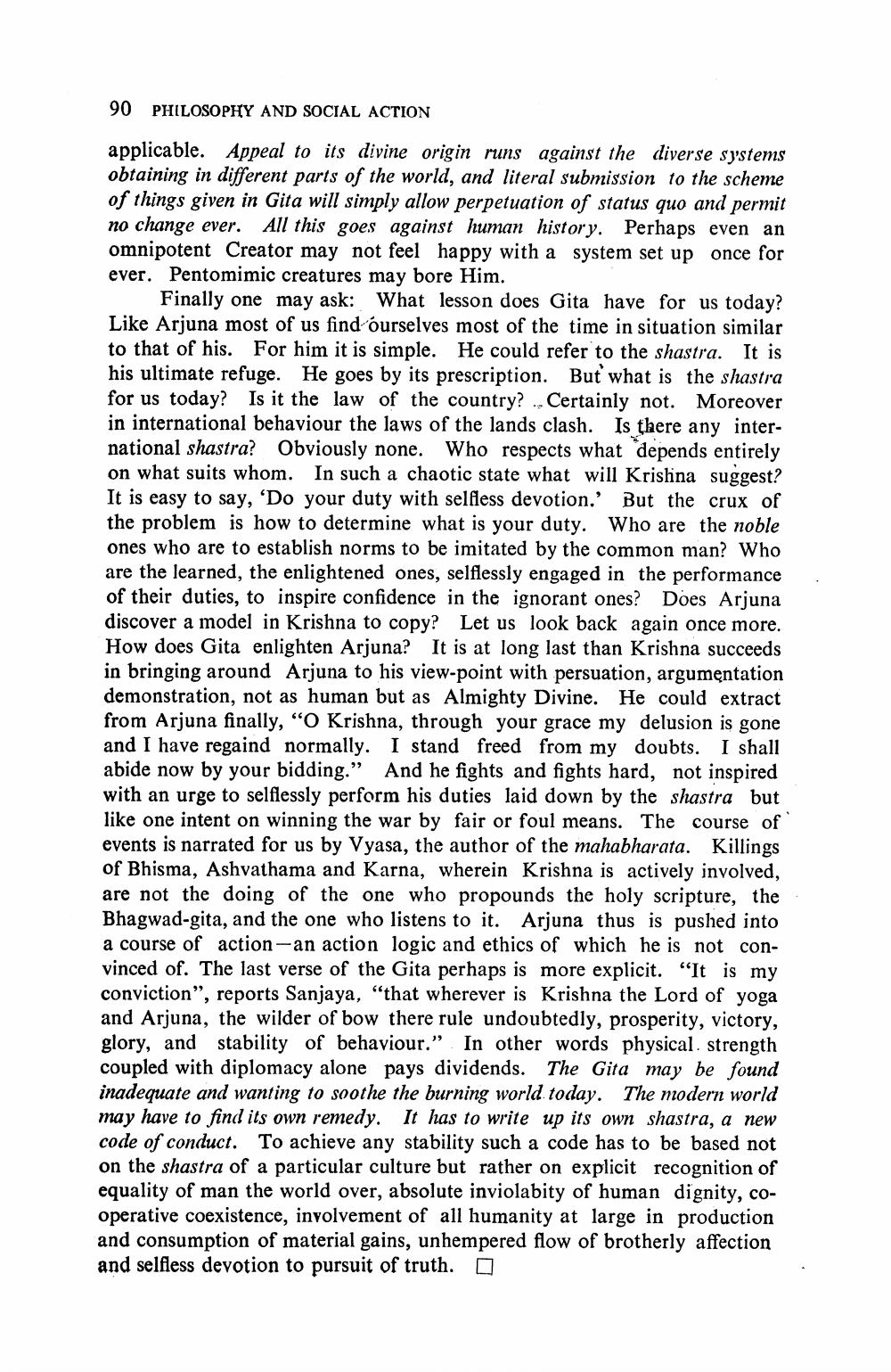Book Title: Social Action And The Gita Author(s): Jagdeva Singh Publisher: Jagdeva Singh View full book textPage 5
________________ 90 PHILOSOPHY AND SOCIAL ACTION applicable. Appeal to its divine origin runs against the diverse systems obtaining in different parts of the world, and literal submission to the scheme of things given in Gita will simply allow perpetuation of status quo and permit no change ever. All this goes against human history. Perhaps even an omnipotent Creator may not feel happy with a system set up once for ever. Pentomimic creatures may bore Him. Finally one may ask: What lesson does Gita have for us today? Like Arjuna most of us find ourselves most of the time in situation similar to that of his. For him it is simple. He could refer to the shastra. It is his ultimate refuge. He goes by its prescription. But what is the shastra for us today? Is it the law of the country? . Certainly not. Moreover in international behaviour the laws of the lands clash. Is there any international shastra? Obviously none. Who respects what depends entirely on what suits whom. In such a chaotic state what will Krishna suggest? It is easy to say, 'Do your duty with selfless devotion.' But the crux of the problem is how to determine what is your duty. Who are the noble ones who are to establish norms to be imitated by the common man? Who are the learned, the enlightened ones, selflessly engaged in the performance of their duties, to inspire confidence in the ignorant ones? Does Arjuna discover a model in Krishna to copy? Let us look back again once more. How does Gita enlighten Arjuna? It is at long last than Krishna succeeds in bringing around Arjuna to his view-point with persuation, argumentation demonstration, not as human but as Almighty Divine. He could extract from Arjuna finally, "O Krishna, through your grace my delusion is gone and I have regaind normally. I stand freed from my doubts. I shall abide now by your bidding." And he fights and fights hard, not inspired with an urge to selflessly perform his duties laid down by the shastra but like one intent on winning the war by fair or foul means. The course of events is narrated for us by Vyasa, the author of the mahabharata. Killings of Bhisma, Ashvathama and Karna, wherein Krishna is actively involved, are not the doing of the one who propounds the holy scripture, the Bhagwad-gita, and the one who listens to it. Arjuna thus is pushed into a course of action-an action logic and ethics of which he is not convinced of. The last verse of the Gita perhaps is more explicit. "It is my conviction", reports Sanjaya, "that wherever is Krishna the Lord of yoga and Arjuna, the wilder of bow there rule undoubtedly, prosperity, victory, glory, and stability of behaviour." In other words physical strength coupled with diplomacy alone pays dividends. The Gita may be found inadequate and wanting to soothe the burning world today. The modern world may have to find its own remedy. It has to write up its own shastra, a new code of conduct. To achieve any stability such a code has to be based not on the shastra of a particular culture but rather on explicit recognition equality of man the world over, absolute inviolabity of human dignity, cooperative coexistence, involvement of all humanity at large in production and consumption of material gains, unhempered flow of brotherly affection and selfless devotion to pursuit of truth. OPage Navigation
1 ... 3 4 5
